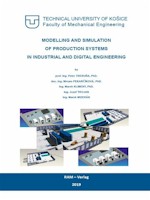|
 |
INTRODUCTION
The presented monograph deals with the implementation of procedure, model-ling and simulation of production systems within industrial and digital engineering.
The major part of the monograph is aimed at the issue of company production processes, i.e. modelling and simulation in particular. These processes are analysed and planned with assistance of chosen software modules to create a link between a digital image of production and real in-house production process. Actual debug-ging of line programmes takes place in a digital environment of a suitable applica-tion in connection with specialized components which generate signals and behav-iour of objects instead of the production line. This revolutionary solution enables us to prevent collisions and errors in projects much sooner, even before production halls are constructed. Currently, when production companies seek to minimize their costs of production or costs of production implementation or possible changes of production, the application of new PLM systems becomes an inseparable part of a modern company. PLM systems cover management and control operations of all processes within product life cycle. The necessity to track a product from its plan and design, through production planning to actual production guaranteed that standards are followed which, eventually, gave rise to a unique system that uses sophisticated software tools to control and manage data concerning a given product. Advantages of the use of PLM system outweight initial costs of its implementation. Modelling and simulation of a manufacturing process means to create a digital image of how the production looks and which activities are performed within the production. Addition-al analyses or simulation of a manufacturing process might expose potential errors in the process, bottlenecks etc. PLM systems could as well be used for virtual com-missioning. This technology enables detailed digitalisation of production, focused on a product or production equipment, and subsequent simulation of a required production process according to project documentation. Such simulation in a PLM system environment results in a ready programme for a company production line. This saves time necessary for testing and debugging of operations on the produc-tion line after commissioning in the production hall. Time savings come even in an initialpoint of planning, when a number of errors and collisions may be exposed which might occur during actual production.
The presented monograph is divided into 21 chapters following each other. These chapters provide theoretical as well as practical information on modelling, simulation and PLM systems in connection with real implementation of I 4.0 in industrial prac-tice.
Authors
